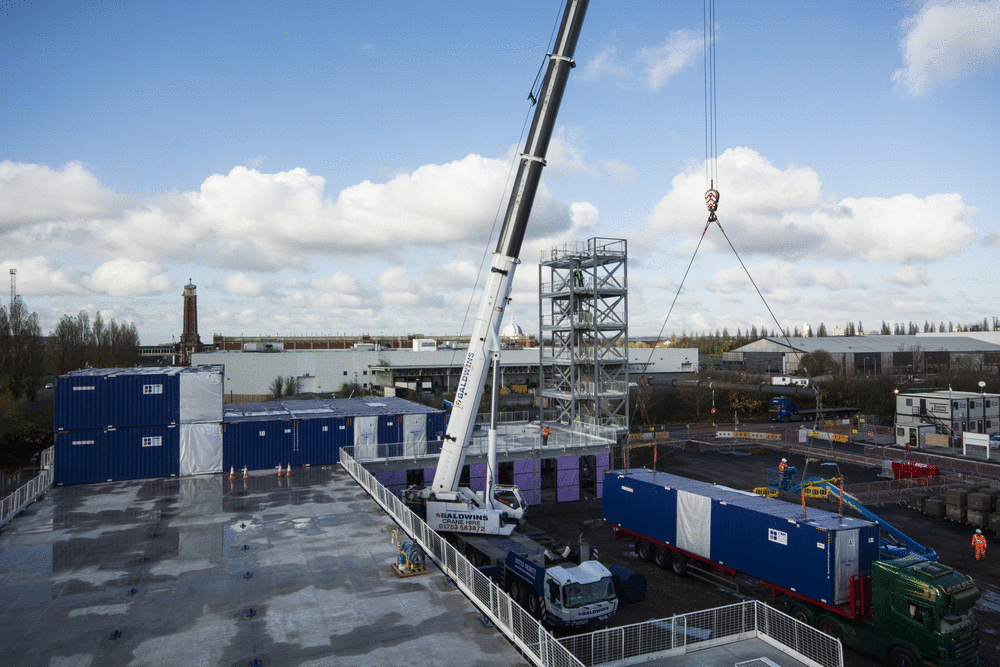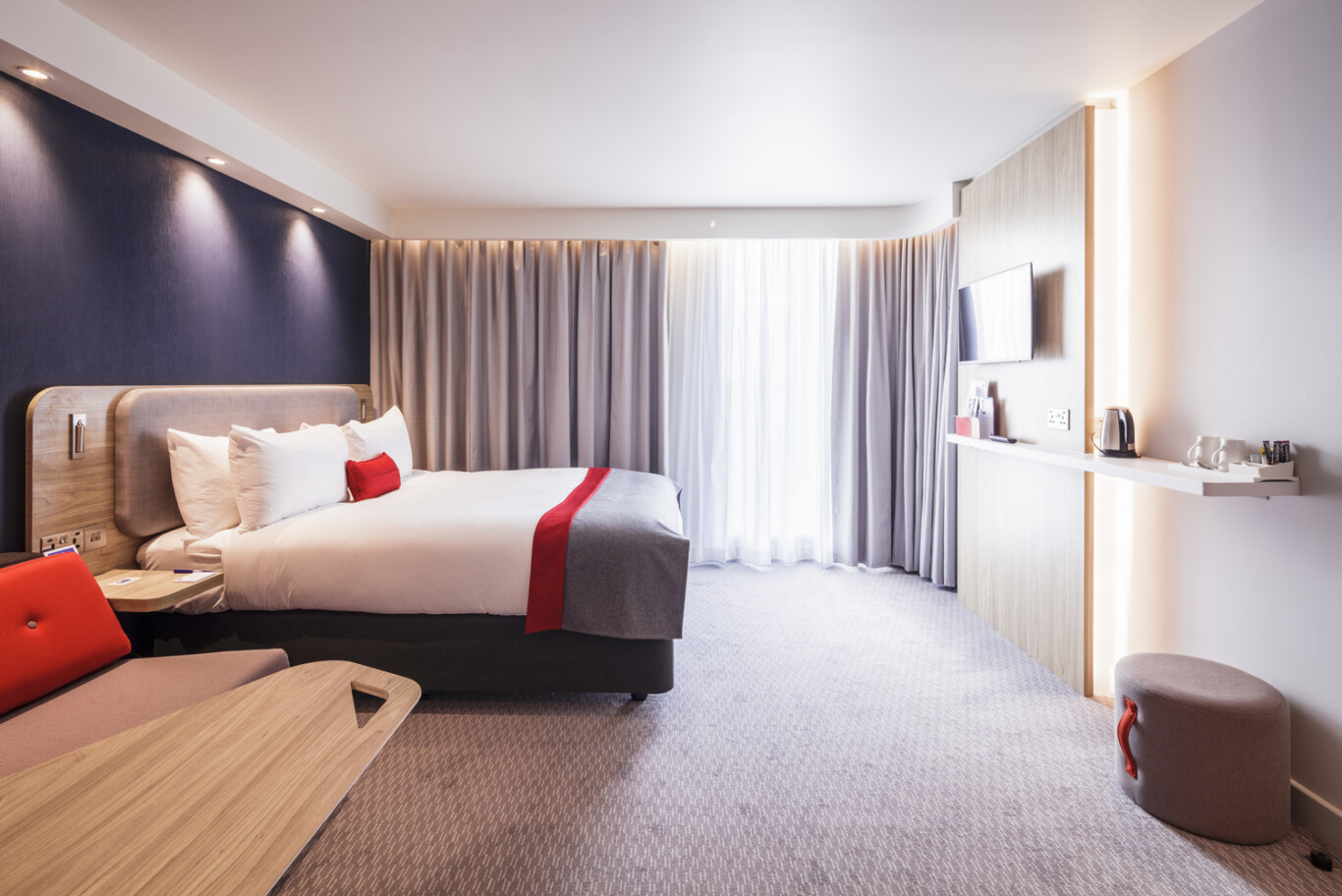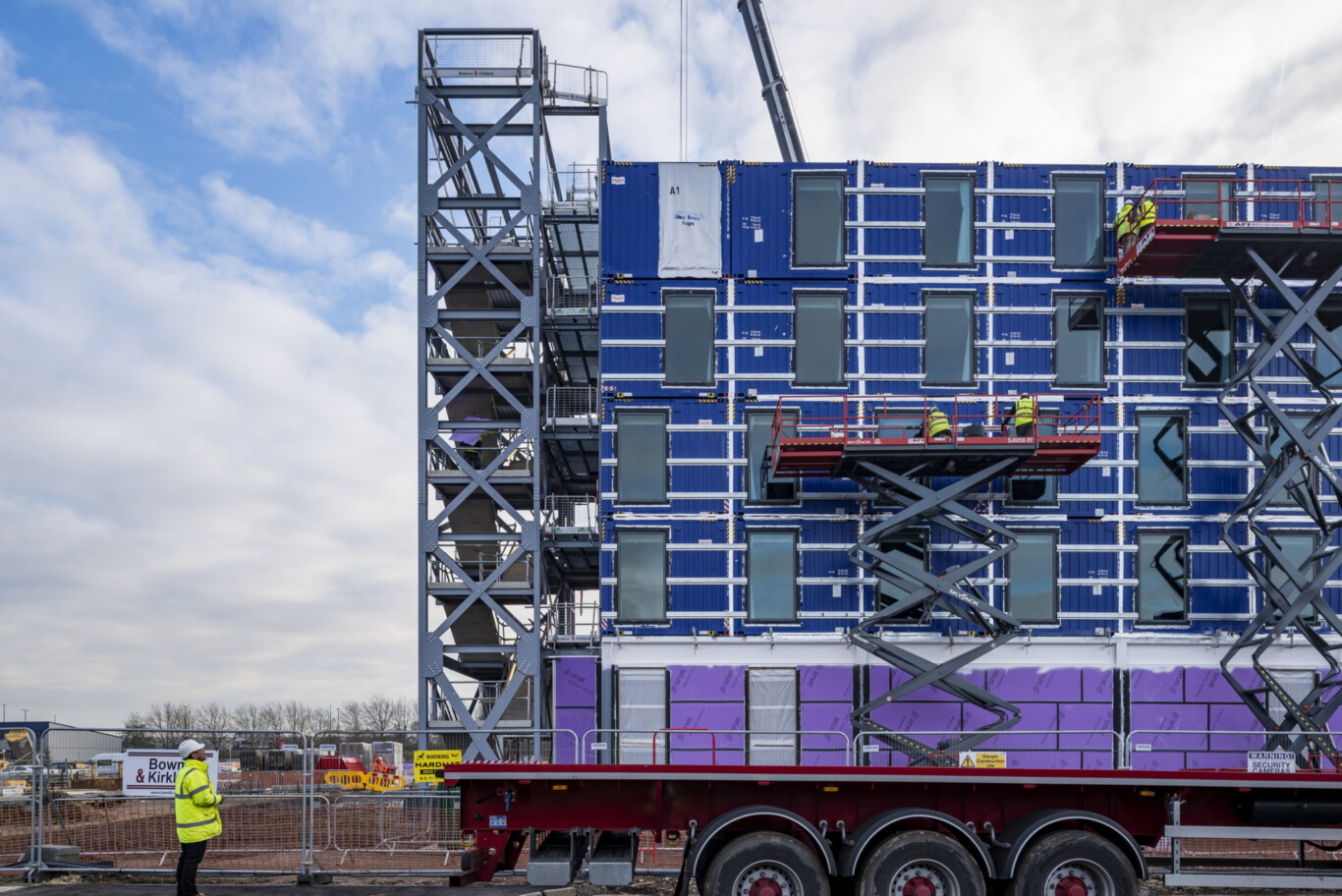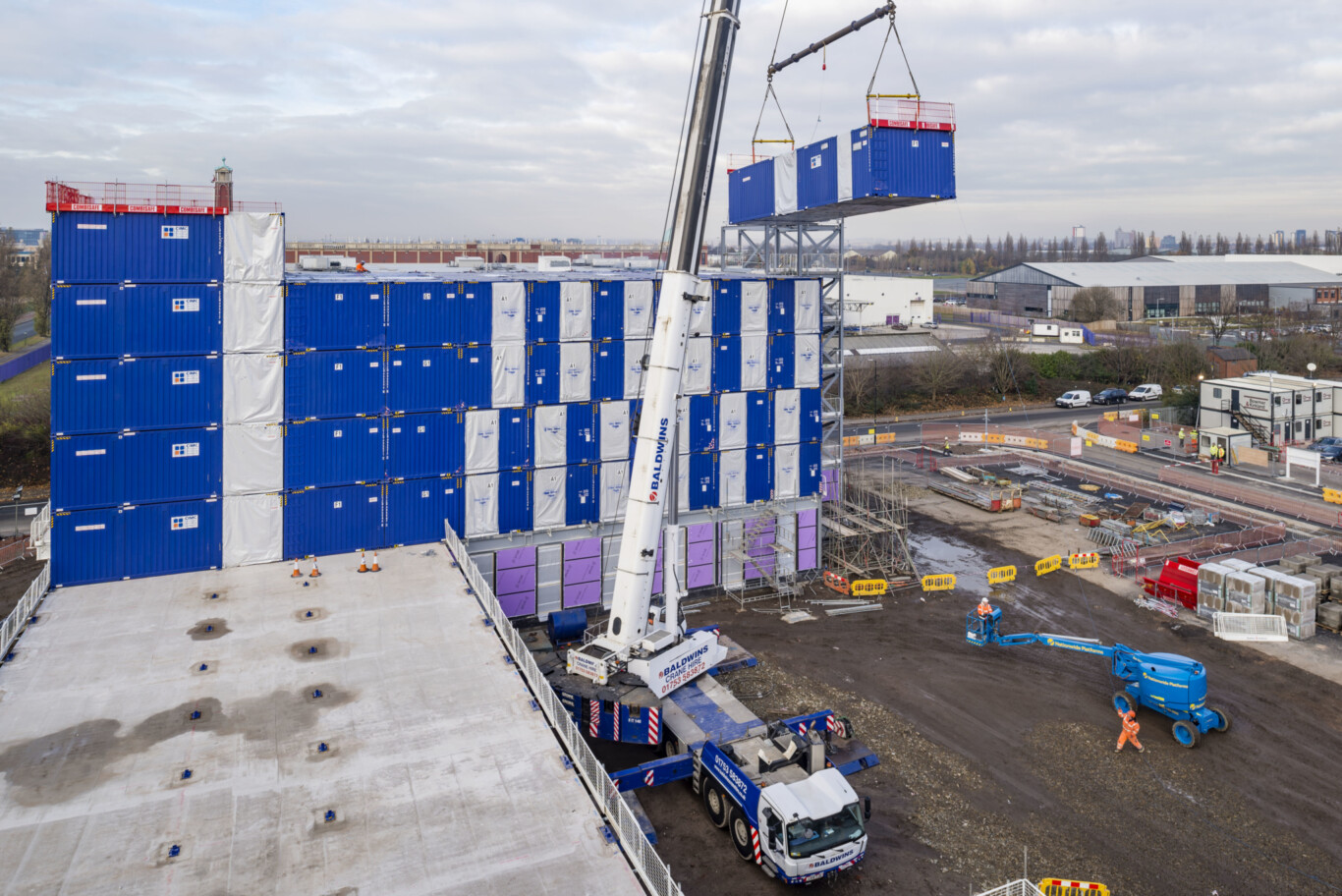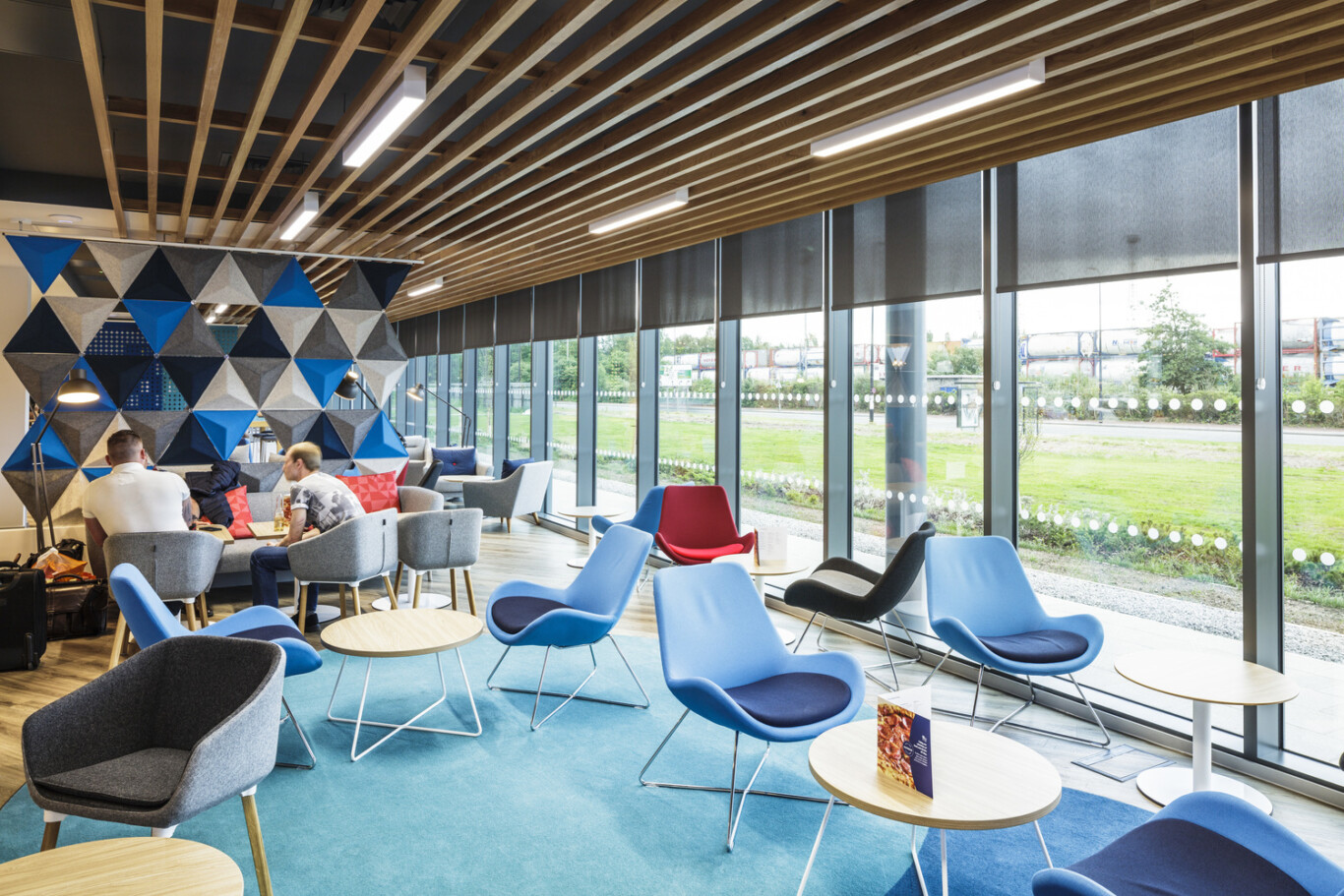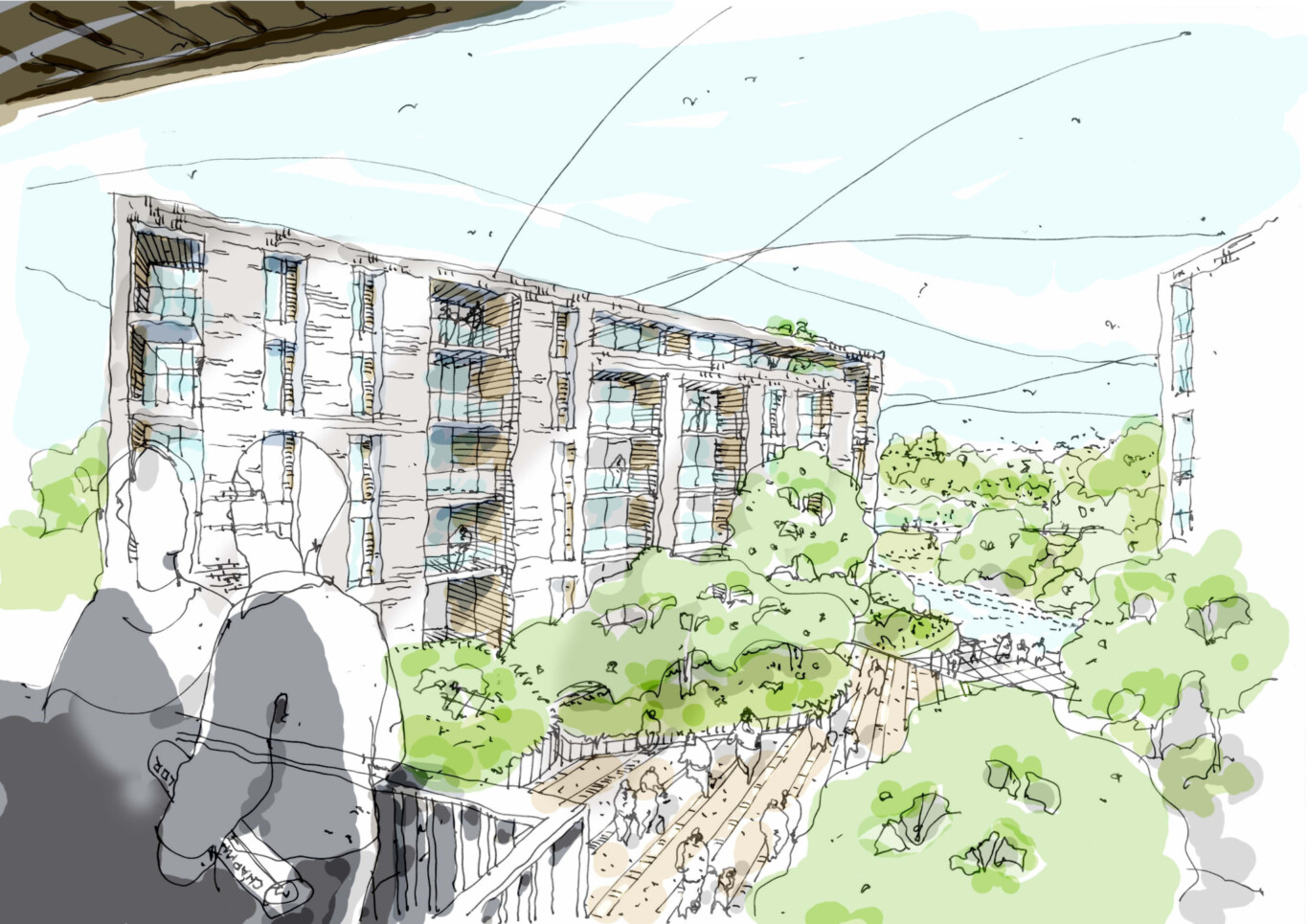What is modular construction?
In this Insight Paper, Director Michael Swiszczowski discusses modular construction, particularly its role in addressing the UK’s building capacity problem.
What is modular construction?
Modular construction is a form of off-site construction in which a building’s components, or modules, are constructed in a factory setting before being transported to the site for assembly. People are most familiar with this type of construction when using bathroom pods, which are a standard construction method in many residential and hospitality projects.
In recent years, we have seen a rise in volumetric construction, which involves the off-site construction of as much of a building as possible before being brought to the site. Typically, a volumetric project would construct a complete room, with a bathroom inside that room, part of the corridor and, perhaps, some external finishes.
In terms of the housing shortage, volumetric modular construction has a key role to play in pushing the industry forward.
The building's components are constructed in a factory before assembly on site.
What are the types of modular construction?
If you imagine a scale from traditional on-site construction to full-scale off-site construction, bathroom pod construction is much nearer the former, with most of the building still constructed on-site in a conventional manner. Unitised façade systems and external envelopes are further towards the middle of the scale, and these have been produced partly off-site for decades. Further along, are “flat-pack” solutions involving cross-laminated timber or concrete cross-wall construction. Typically, these structures would be constructed in panelised pieces off-site, then delivered flat on a vehicle to be assembled on-site.
Finally, there is volumetric construction, where the majority of the building components are fabricated off-site in factory-controlled conditions before delivery to the site. With volumetric construction, all the internal finishes arrive completed, which is very useful for developments in areas such as student housing or hospitality because no ‘wet trades’ come onto the site after delivery. This greatly reduces the number of people on-site and the length of the programme, as well as providing programme certainty.
Chapman Taylor is capable of working with any of these methods, noting that modular solutions may not always be appropriate. We don’t tie ourselves in with any particular provider, and we will advise clients and others in a way that best suits the requirements of the particular site logistics and project brief. However, we do think that to address the UK’s capacity issue, particularly in terms of the housing shortage, volumetric modular construction has a key role to play in pushing the industry forward.
With a hotel, a Build-to-Rent scheme or student accommodation, where space is rented, a substantial income will be generated a lot earlier because of the use of off-site methods.
What are the benefits of off-site construction in general, and volumetric in particular?
Off-site construction has several benefits in terms of programme, waste, cost and, of particular interest to us, quality. The building’s elements can be constructed more quickly in controlled conditions – if necessary, the process can continue 24/7 and involve finished products continuously rolling off the factory floor. The process is not governed by external factors in traditional builds, such as adverse weather, challenging site logistics, the industry’s skills shortage, etc. The factory process will often involve people specialising in one specific area to a very high standard, leading to better product quality. The speed of the programme leads to earlier project completion.
Waste can be significantly reduced with an off-site process. A switch to off-site construction could prevent as much as 50% of waste on traditional building sites, with all the attendant financial and environmental benefits. Meanwhile, there are attractive economic advantages for the developer—in today’s market, it isn’t necessarily always cheaper to build off-site in the first instance, but the benefits to the client then accrue in a number of ways.
Our Holiday Inn Express modular hotel project in Trafford City, Manchester, took just nine months from the start of the construction process on site to completion, saving six months of construction time compared to the traditional build programme. This resulted in the client avoiding six months’ interest payments on loans and only paying the contractors for a relatively short time on site. It also meant that they could start trading six months earlier, with all the associated revenue generation that was brought about.
The client estimates that they saved approximately £1 million in costs compared to a traditional form of construction and told us that they had never been involved in a project that was so stress-free.
The client estimates that considering all of these financial aspects, they saved approximately £1 million in construction costs compared to a traditional form of construction, which is particularly impressive in the context of the overall project cost of £16.2 million. The original development team, a joint venture between Mill Lane Estates, Marick and Topland, could sell the hotel before practical completion because the fully finished bedroom pods were installed early during the build programme.
With a hotel, a Build-to-Rent scheme, or student accommodation where space is rented, substantial income will be generated much earlier because of off-site methods. In addition, on the building contract side, the shorter building schedule means lower labour costs and reduced overheads. Investors get a return on their investment much more quickly, paying less interest on loans.
Tell us some more about how the Holiday Inn Express project came about?
The Holiday Inn Express project came to us through the principal contractor, Bowmer & Kirkland. Planning had been achieved for a hotel at the Holiday Inn Express site, but the client wanted to change to a volumetric modular approach. Bowmer & Kirkland were eager for us to come on board because they needed a firm of architects with whom they were comfortable working and who had the skills to work on a project of this type.
InterContinental Hotels Group’s Holiday Inn Express brand was launching its new generation of hotel design – a modern, clean and straightforward approach tailored for today’s ‘smart traveller’. Ours was to be the first new-build, ‘Generation IV’ design in the UK.
We started on a steep learning curve to understand the original design intent and the implications of adopting a volumetric modular approach using a purpose-built container system by CIMC Modular Building Systems. We built a new BIM model in Revit, incorporating the container elements, and had to answer some key requests for information to allow the factory to start procuring the material for a prototype – all in the first three weeks. It was an ambitious beginning to the project, but we delivered all the information on time.
We took meticulous care with our advice to CIMC, the Chinese modular container provider, ensuring that the pods met British Building Regulation standards. As a result, we formed a very strong working relationship with CIMC and are now working with them as consultants on other projects around the world.
It was a fabulous project to be involved in, and it progressed at pace but in a smooth and controlled manner. The client told us that they had never been involved in a project which was so stress-free. It was a great testament to what modular construction can achieve. Happily, the project won two major off-site industry awards recently – 'Retail/Leisure Project of the Year' at the 2018 Offsite Construction Awards (as well as being highly commended in another category) and the ‘Offsite Construction’ Award at the 2018 North-West Regional Construction Awards.
What happened after the project?
Everyone who worked on the project got together afterwards for a ‘lessons learned’ meeting. It was a very useful debriefing session that helped us all hone our approach to future projects. Chapman Taylor has a research and development model for modular construction called Umbrellahaus®, and the lessons learned on the Holiday Inn Express development have helped advance that.
The project acted as a gateway to the world of modular construction, and we decided to talk to several modular providers about the many different possible methods to learn as widely as possible. We learned about some of the nuances which arise when using a modular approach to construction – there are situations which arise with modular construction that you don’t usually come across with traditional projects, which typically follow a very linear RIBA Plan of Work format and it is these challenging situations which require subtle and imaginative solutions as well as a flexible attitude to approaching design and construction in new ways.
People are now paying much more attention to quality than ever before, and modular construction fits naturally into the picture.
Is the finished product as good as with traditional construction?
Better. Regarding the materials and finishing quality, everyone was delighted by the result at the Holiday Inn Express building. There were some minor snagging issues, but a fraction of the number that would typically arise, all of which were resolved very quickly. The process was incredibly efficient, and the whole team was very relaxed during the run-up to the final handover, which is unusual for a project of that size. The hotel, operated by Tower Hotel Management, achieved Practical Completion on time and was fully booked for its opening weekend. It has been trading successfully ever since.
We are working with many leading developers and modular manufacturers on projects across the residential, student accommodation and hospitality sectors.
It can also lead to better environmental credentials – you are more likely to get a well-sealed and airtight system, allowing for a much lower energy requirement.
Following the opening, we have shown several developers, contractors and facility managers around the finished building, and they have always been impressed by its quality.
Many people associate the term ‘prefab’ negatively with substandard post-war buildings. How is modular different?
There is certainly a perception out there that needs to be shifted, which associates off-site construction with the prefab of old. Modular is not prefab. Of course, prefabrication was a form of modular process—it involved construction off-site—but the design and construction process involved with modular construction is vastly superior, and there is a very different business case for it.
We have a crisis in the UK with housing capacity – there is a severe housing and skills shortage. Modular construction is one means of addressing that, increasing the number of homes delivered each year. Modular is also becoming more relevant because of the increase in Build-to-Rent schemes, which are residential developments where the investors and developers retain and operate the building for its lifetime rather than just flipping it for sale when built.
There is much more focus on the quality and maintenance of the product for the lifecycle of the building. For example, pets are a major consideration in the Build-to-Rent sector – requiring the finishes to be approached differently. People are now paying more attention to quality than ever, and modular construction fits naturally into the picture. So it bears little relation to the lower-quality prefab buildings we saw decades after the Second World War.
Off-site may have been around for decades, but the reasons why people are interested in it are very different now, and the people involved are different – not just manufacturers but also large institutional investors. Legal and General, for example, have announced their own modular factory, and Berkeley Group are also getting involved in the sector. The Farmer Review has helped by stressing the need for the construction industry to ‘modernise or die’, as has the mention of off-site construction in the UK government white paper aimed at ‘fixing our broken housing market’.
We have had very positive discussions with, for example, the Mayor of London’s office and various local authorities, which are keen to promote modern methods of construction as one means of dealing with the housing crisis. The former Director of Housing in Manchester City Council is also an advocate of the benefits of modular construction and wants to see residential developers adopting this approach.
How well-placed is Chapman Taylor in the modular sector?
We have been investing in R&D initiatives related to the modular sector for some time, and we are now able to complement that knowledge with practical experience of modular design and construction processes. By working collaboratively with other stakeholders, local authorities, consultants, contractors, and modular suppliers, we are able to offer comprehensive advice to our clients for each individual project across our core sectors. We have published several insight papers on the subject, which have proved to be very popular.
We are increasingly viewed as experts in the modular sector, working with many leading developers and manufacturers on projects across the residential, student accommodation and hospitality sectors. The key to our continued success will be collaborating with our peers and striving for constant improvement in everything we do. Ultimately, it’s all about engaging with like-minded people to implement the step-change our industry so desperately requires.
How have Chapman Taylor’s clients responded?
Clients are keen to understand more about modular solutions and how their project could benefit from them. Chapman Taylor offers an impartial view and advice based on experience, which is very valuable in such a new market.
Technology is permeating our culture at a rapid rate, impacting many aspects of our lives. The modular approach to construction could be the next big disruption to our industry. We should embrace this and learn how to best use this technology to create well-designed buildings that meet the needs of our clients for both the immediate and long-term.
Ultimately, it’s all about engaging with like-minded people in order to implement the step-change our industry so desperately requires.
What next for Chapman Taylor and modular?
We are working on several modular projects for the Build-to-Rent, student accommodation, and hotel sectors. Some are in the early concept stages, and others are existing schemes for which we are looking to develop modular solutions. We are advising clients on the technical design options while respecting the original designs, which have planning approval.
Our expertise in using 3D BIM technology is proving invaluable for our modular work. We can quickly generate design studies and present them in a 3D format to allow our clients to visualise the proposals early on in the design process. This then seamlessly follows into the more technical aspects, where we can generate models and components that are used by the fabrication team in the factory for construction.
Chapman Taylor is convinced of the potential benefits of this exciting sector for designers, clients, and end-users alike. We look forward to participating in the next phases in the evolution of modular construction in collaboration with our clients and other stakeholders.
